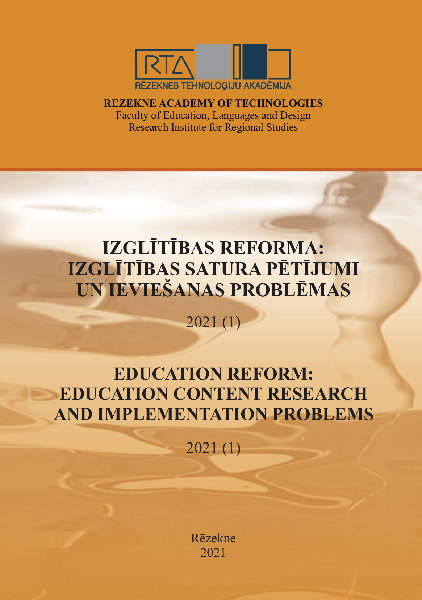ENRICHING VOCABULARY WITH ADJECTIVES FOR ELEMENTARY SCHOOL PUPILS’ READING LITERACY
DOI:
https://doi.org/10.17770/er2021.1.5349Keywords:
adjectives, competency-based approach, teaching methods, reading literacyAbstract
The trend observed in the education system is that pupils often spend their free time using mobile phones or computers for entertainment. As a result, pupils have a rather modest vocabulary, which poses a problem to formulate and express their thoughts in the learning process, to describe the central thesis in more detail, for example, using adjectives.
The research aim is to determine the methods used in teaching adjectives and their usefulness in the Latvian language class in order to improve pupils’ reading literacy. The research methods include analysis of corresponding theoretical and methodological literature, a teacher survey, and processing and interpretation of the data obtained. The most appropriate methods for teaching the topic “Adjective”, according to the teachers, are the explanatory illustrating and reproductive method; whereas the documents studied concerning the introduction of competency-based education recommend mainly the heuristic and research method, and this creates a relative mutual discrepancy. To promote the pupils’ reading literacy, teachers need to explore the children’s interests and use them as the basis for creating methodological materials about adjectives which correspond to modern reality and are fascinating and interesting to pupils. Such an approach would motivate pupils to appreciate the importance of using adjectives in everyday life. In the Latvian language class, when teaching the topic “Adjective”, teachers need to try and work as counsellors, gradually guiding their pupils to achieving the goal by noticing different patterns for adjectives, like competency-based education provides.
Downloads
References
Anspoka, Z. (1999). Integrēts latviešu valodas mācību saturs un tā metodika sākumskolā. Promocijas darbs. Rīga: Latvijas Universitāte. Pieejams: http://dspace.lu.lv/dspace/ bitstream/handle/7/31290/Anspoka_Z_Integrets_Latviesu_valodas_macibu_1999.pdf?sequence=1
Anspoka, Z. & Helmane, I. (2016). Sākumskolas skolotāja grāmata 3.klasei. Lielvārde: Lielvārds.
Āboliņa, L. (2020). Daudzveidīgu lasīšanas stratēģiju apguve kā mācīšanās prasmju pamats. Society. Integration. Education. Proceedings of the International Scientific Conference May 22nd-23rd, Volume III. Pieejams: http://journals.rta.lv/index.php/SIE/article/ view/5165/4528
Bikše, K. (2018). Mācību metožu, organizācijas formu un līdzekļu izvēle, kurā ir kurā ir dažādi mācību materiāla apguves līmeņi. Pieejams: http://pedagogs.lv/2018/02/21/macibu-metozu-organizacijas-formu-un-lidzeklu-izvele-kura-ir-kura-ir-dazadi-macibu-materiala-apguves-limeni/
Bota, A.O. (2017). Teaching style – conservative and current significations in cord vision. Bulletin of the Transilvania University of Brasov. Series VII: Social Sciences. Law. Retrieved from: http://web.a.ebscohost.com/ehost/pdfviewer/pdfviewer?vid=5&sid= 06d704ed-c018-4172-8730-ee9e449bbfcf%40sessionmgr4008
Eriksons, E. (1998). Identitāte: jaunība un krīze. Rīga: Jumava.
Grashilova, I. & Kimova, I. (2020). Designing the model of professional development of teachers taking into account axiological imperatives of continuing education. Euromentor, Volume 11, Issue 1. Retrieved from: http://web.a.ebscohost.com/ ehost/pdfviewer/pdfviewer?vid=1&sid=1d0c0237-8188-4004-b1dc-a2c2165914b7%40sdc-v-sessmgr01
Harackiewicz, J.M. & Hulleman, C. (2009). The importance of interest: The role of achievement goals and task values in promoting the development of interest. Social and Personality Psychology Compass, 4(1), 3-5. Retrieved from: https://www. researchgate.net/publication/229978920_The_Importance_of_Interest_The_Role_of_Achievement_Goals_and_Task_Values_in_Promoting_the_Development_of_Interest
Kalvāns, Ē. (2018). Attīstības psiholoģija. Rēzekne: Rēzeknes Tehnoloģiju akadēmija.
Laiveniece, D. (2018). Latviešu valodas mācību saturs laiku laikos. Ko? Cik? Un vai Un vai vispār? Tagad. Zinātniski metodiskais izdevums. 80.-83.lpp. Pieejams: https://maciunmacies.valoda.lv/wp-content/uploads/2019/10/TAGAD_1.2018_ web_small.pdf
Lazdiņa, S. (2018). Par un ap latviešu valodu. Tagad. Zinātniski metodiskais izdevums. 4.-5.lpp. Pieejams: https://maciunmacies.valoda.lv/wp-content/uploads/2019/10/ TAGAD_1.2018_web_small.pdf
Shaffer, D. & Kipp, K. (2013). Developmental psychology (Childhood & adolescence). Wadsworth: Genage Learning.
Skola2030 (2019). Izglītība mūsdienīgai lietpratībai: mācību satura un pieejas apraksts. Pieejams: https://static.lsm.lv/documents/ge.pdf
Vaivade, V. & Anspoka, Z. (2014). Latviešu valodas mācīšana un tās kompetence: teorija un prakse. Valodu apguve: problēmas un perspektīva: zinātnisko rakstu krājums, X. Liepāja: LiePU. Pieejams: https://www.liepu.lv/lv/1075/10-zinatnisko-rakstu-krajums
Wullschleger, A. & Garrote, A. (2020). Effects of teacher feedback behavior on social acceptance in inclusive elementary classrooms: Exploring social referencing processes in a natural setting. Retrieved from: https://www.sciencedirect.com/science/article/ pii/S0361476X20300060


